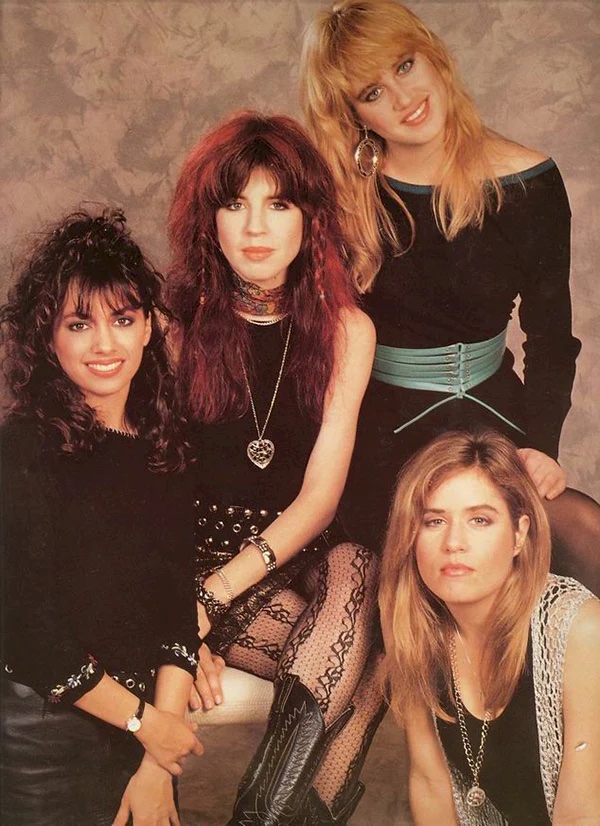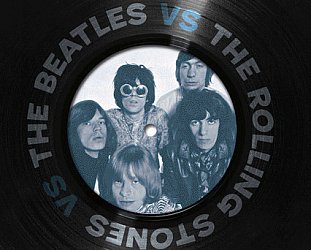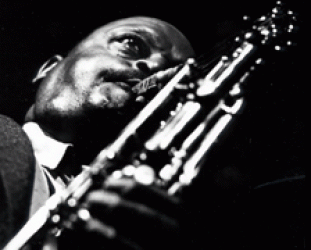Graham Reid | | 4 min read
Manic Monday

The Bangles' career – a few names before The Bangs then finally The Bangles – is neatly a decade: the big hair Eighties.
Theirs is a simple story in many ways, just complicated by events which overtook them.
Author Bickerdike spent considerable time interviewing them and those on the early scene in California when they were coming up (Sid Griffin and Henry Rollins among them), dug out reviews from numerous sources and weaselled into record company politics.
She writes in a plain and direct style, backing up any assertions with relevant quotes.
A job well done.
But in many ways it's a story that was always going to end badly and abruptly at a meeting in an office at which two members walked away to the surprise of the founding Peterson sisters Debbi and Vicki.
The stable line-up we know – the Petersons, Susanna Hoffs and Michael (Micki) Steele – were inspired by Sixties pop and wanted to be like the Beatles: a rock'n'roll band of equals.
But outside of that ambition they were very different people: singer/guitarist Vicki always keen to keep the vision on course; singer/guitarist Hoffs incredibly cute, photogenic, pro-active and also wedded to the idea of a band although the press singled her out; drummer Debbie who also sang feeling marginalised at the back of the band, away from the spotlight and increasingly irritated by the attention Hoffs was getting; and the withdrawn bassist Steele who, like Hoffs, came from a monied background but was wounded by it. She is sullen and withdrawn and barely contributes to the narrative (aside from sourced quotes).
After the working-class Petersons try out other musicians, get club dates and slog it out for a few years, Hoffs arrives. She comes from a confident, artistic family in a more wealthy part of LA (family friends include Leonard Nimoy who she convinces to appear in a Bangles video) and is driven, using whatever connections she can make.
Hoffs comes off as the one who got the band a leg up and into being contenders.
They played clubs constantly, recorded an EP (which included their cover of the hit the La De Das had, How is the Air Up There) and Hoffs hustled.
But the Go-Gos had already established themselves so the Bangles were mostly dismissed as Go-Go wannabes, and the male dominated music business felt it already had a group of rock'n'roll girls.
However they get a break and sign to Columbia who immediately assign a producer to them.
If there is a villain in this story it isn't Hoffs who gets all the media attention which causes internal tension it is producer Dave Kahne (not interviewed for the book) in his first major gig as a producer with a budget and a big label looking over his shoulder.
According the women he undermines them and erodes their confidence, dismisses their songwriting and, worse, brings in other musicians to play on the sessions.
 The press immediately go into “Monkees mode”: the Bangles don't play their own instruments, they are manufactured and so on.
The press immediately go into “Monkees mode”: the Bangles don't play their own instruments, they are manufactured and so on.
They have a modest hit (Going Down to Liverpool sung by Debbi but they didn't write it) and slog it out on the road, all the time being dismissed as bimbos or worse.
There's an even more successful hit (If She Knew What Wants sung by Susanna but again, they didn't write it). Interviews are all about the Go-Gos, about the Bangles being manufactured (because they don't write their hits), being cute, do they have male groupies and so on.
Then they get a very break, so you'd think.
Prince, then the hottest name in the business, sees them on MTV and is smitten by Hoffs. He offers them a song – Manic Monday sung by Susanna, apparently he'd offered to just about anyone in a skirt – but the Bangles love it, record it and it becomes a hit.
The interviews swivel: now it is all Prince-Prince-Prince (and them not writing their own songs). Is Hoffs sleeping with Prince, is she going to leave the band and join his stable?
And so it goes.
More touring, interviews asking the same-same questions, Susanna being the centre of attention . . .
They are eroded from within by jealousy: Hoffs seems mostly oblivious to it, insisting to magazines and photographers that the Bangles are a band, she's not the front-woman because they all write and sing.
Then the big hit, their number one Walk Like an Egyptian (again, not written by them) and although it's hailed they are now a band with a gimmick hit.
They do more recording without Kahne and it is better but the damage has been done. They are worn down by constant touring, have another hit with a cover of Paul Simon's Hazy Shade of Winter and then their second number one with the ballad Eternal Flame, Susanna sharing a writing credit for the lyrics.
And so it goes with more touring . . .
They ditch their management team in favour of a new one (which is keen to separate Hoffs out and into a solo career), they make poor decisions (they play the opening of a freeway!), Vicki gets married and neither Hoffs nor Steele attend because they are so defeated by touring . . .
And then there's that meeting.
It is a fascinating story – told in detail – about how dreams can die or be deflected by events beyond an artist's control. And in this instance an all-women band enduring the most inane aspects of male expectation and desire.
 Prince is supportive but also comes off as a self-centred jerk.
Prince is supportive but also comes off as a self-centred jerk.
And just to be clear: they all did sing, write and play their own instruments. Mostly.
.
THE AUTHORIZED BIOGRAPHY OF THE BANGLES: ETERNAL FLAME by JENNIFER OTTER BICKERDIKE Grand Central $$40





post a comment